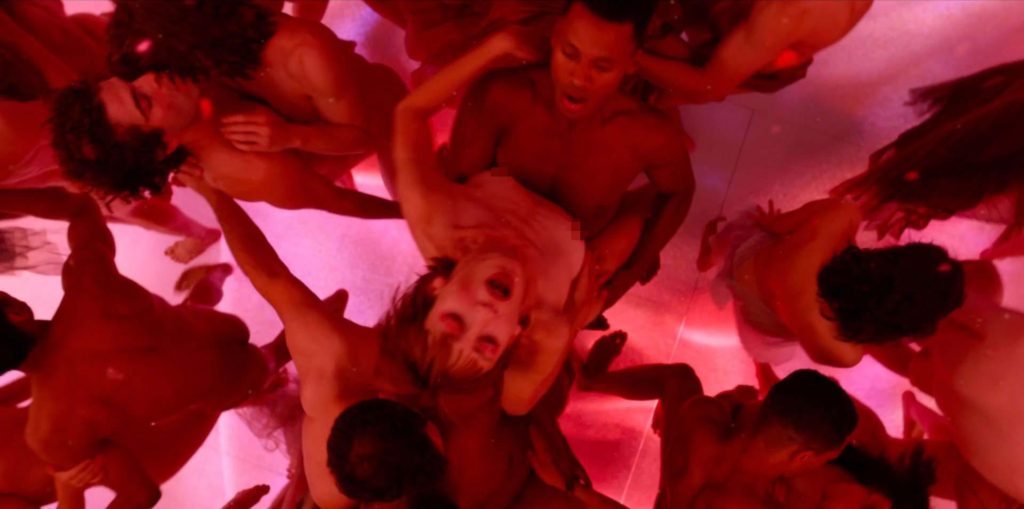Brave new worlds
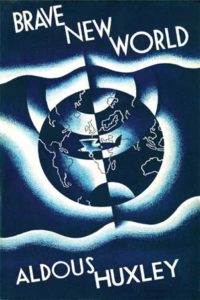 Recently, in a post in this column, I talked about the breadth of science fiction and its subgenres. One of them, utopian and dystopian societies, is very common in literature and cinema. One of the most famous examples is “Brave New World”, a brilliant work by English writer Aldous Huxley, written in 1932, which has already inspired movies and series, as well as countless other references.
Recently, in a post in this column, I talked about the breadth of science fiction and its subgenres. One of them, utopian and dystopian societies, is very common in literature and cinema. One of the most famous examples is “Brave New World”, a brilliant work by English writer Aldous Huxley, written in 1932, which has already inspired movies and series, as well as countless other references.
In the mid-70’s, when I was at the beginning of Civil Engineering graduation, I took an architecture course called Environmental Psychology. The teacher, a young and enthusiastic psychologist, encouraged us to think “outside the box”, leading us to research the most diverse subjects.
As I have always been a science fiction enthusiast, I set out to think about the societies of the future. That was when she asked if I had already read the books “Brave New World” and “1984”. Despite being a veteran of the genre, I didn’t know these books, and I looked for them in the library. The one I got at the time was “Brave New World”, which I read with great intensity, while dealing with countless disciplines, internships and other tribulations of university life.
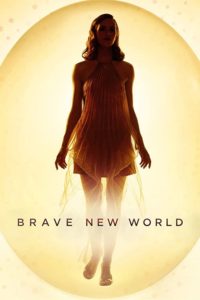 Four decades later, my attention was again awakened on Huxley’s work with the eponymous series by Peacock, carried out in 2020. Watching the first episode, I realized that I needed to revise the book, and redid the reading in the original version. Confirming the thought of the philosopher Heraclitus, that no one bathes twice in the same river, my understanding was totally different from what I had at the age of twenty.
Four decades later, my attention was again awakened on Huxley’s work with the eponymous series by Peacock, carried out in 2020. Watching the first episode, I realized that I needed to revise the book, and redid the reading in the original version. Confirming the thought of the philosopher Heraclitus, that no one bathes twice in the same river, my understanding was totally different from what I had at the age of twenty.
The story takes place in an unspecified future, after the world has suffered long wars and is now subjected to central power. Most of the population lives in modern cities in Europe, while groups of Amerindians are confined to reserves in the ancient American West.
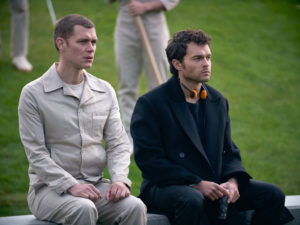 Over the years profound changes have been implemented, the main one being that there are no more families, marriages, pregnancies and natural births. All human beings are designed and created in the laboratory, and prepared to live according to their caste.
Over the years profound changes have been implemented, the main one being that there are no more families, marriages, pregnancies and natural births. All human beings are designed and created in the laboratory, and prepared to live according to their caste.
Thus, embryos of the Alpha caste will receive the best stimuli, those of the Beta slightly less, decreasing for the Gamma, Delta and Epsilon. The embryos of the Epsilon caste, besides being multiplied in dozens of identical twins, still receive less oxygen to be adults with reduced mental capacity, lending themselves to purely mechanical work. Some groups receive more heat, so in the future to work in underground mines or steel mills.
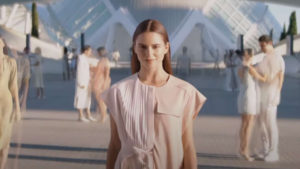 Everyone receives appropriate hypnopedic conditioning in order to reinforce the values of this new society. Sexual freedom, caste separation, collective participation are encouraged, while individualism and personal friendships are discouraged, going so far as to consider the idea of paternity or marriage a blasphemy.
Everyone receives appropriate hypnopedic conditioning in order to reinforce the values of this new society. Sexual freedom, caste separation, collective participation are encouraged, while individualism and personal friendships are discouraged, going so far as to consider the idea of paternity or marriage a blasphemy.
Everyone has their basic needs met, according to their castes, and thanks to the evolution of medicine, everyone has a young and beautiful appearance. When the body cannot keep pace with life, they simply go to specialized centers and die. Since there are no personal ties, no one misses who died, and the very idea of death as a natural fact is instilled in children from an early age.
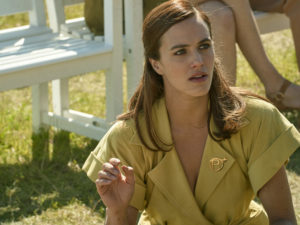 The main value of this society is that everyone should be happy, and for that there is Soma, a non-addictive drug with no side effects, which eliminates any feeling of sadness, anger, jealousy, dissatisfaction, etc.. It is the real drug of happiness.
The main value of this society is that everyone should be happy, and for that there is Soma, a non-addictive drug with no side effects, which eliminates any feeling of sadness, anger, jealousy, dissatisfaction, etc.. It is the real drug of happiness.
Alpha Bernard Marx and beta Lenina Crowe live in this world. When Bernard invites the young woman to spend a weekend in the Savages Reserve, it is just a tourist program similar to visiting a zoo.
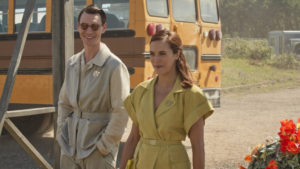 Upon requesting permission to visit, Bernard learns that his superior had made a similar trip two decades earlier, and an accident had happened to the young woman who had accompanied him. She just disappeared, and they never heard from her again.
Upon requesting permission to visit, Bernard learns that his superior had made a similar trip two decades earlier, and an accident had happened to the young woman who had accompanied him. She just disappeared, and they never heard from her again.
Upon reaching the reserve, Bernard meets John, a young white man who lives among the natives, but who says he does not belong to them. When he introduces the newcomers to his mother, Linda, Bernard makes the connection and finds out who the two are. With the necessary contacts, he gets permission to take John and Linda to New London, to reintegrate them into civilized life.
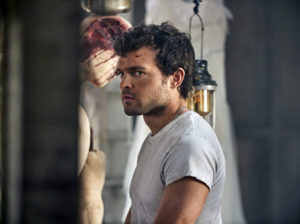 As anyone could expect, adaptation is very difficult. Linda, deformed by age, lack of proper care and drinking, indulges herself in consumption of Soma. John, despite his immediate success for the novelty, is unable to identify himself with the New London way of life, with a moral code totally different from his own, absorbed from the characters of Shakespeare, from the only book he owned and which served as a life reference. Like these characters, his destiny will also be tragic.
As anyone could expect, adaptation is very difficult. Linda, deformed by age, lack of proper care and drinking, indulges herself in consumption of Soma. John, despite his immediate success for the novelty, is unable to identify himself with the New London way of life, with a moral code totally different from his own, absorbed from the characters of Shakespeare, from the only book he owned and which served as a life reference. Like these characters, his destiny will also be tragic.
Despite being referenced in a lot of books and films, the work of Huxley had two adaptations to TV, in 1980 and 1998, and the Peacock’s series in 2020. Interestingly, each of these adaptations even being based on the universe created by Huxley, followed its own path.
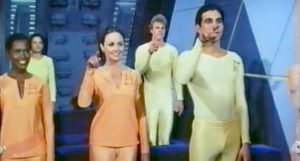 The 1980 movie, made in a two-part miniseries format, was the most faithful to the book. The costumes and sets resemble the old Star Trek pattern, and is considered by many to be a sci-fi classic. The only known name of the cast is Keir Dullea, the protagonist of “2001: A Space Odyssey” (USA, 1968). Unfortunately it is hard to find it, except via torrent – and without subtitles.
The 1980 movie, made in a two-part miniseries format, was the most faithful to the book. The costumes and sets resemble the old Star Trek pattern, and is considered by many to be a sci-fi classic. The only known name of the cast is Keir Dullea, the protagonist of “2001: A Space Odyssey” (USA, 1968). Unfortunately it is hard to find it, except via torrent – and without subtitles.
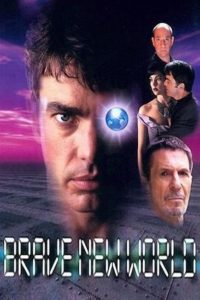 In 1998 the story got a film version for TV, with Peter Gallagher playing Bernard Marx and Leonard Nimoy, the Spock of Star Trek, in a smiling and relaxed version. In this movie the special effects are very modest, and the filming in the “civilized world” was done in Los Angeles, without much makeup. John Cooper, the Savage, was played by Tim Guinee in a cowboy costume lost in the big city. In this version, much emphasis was placed on the couple Marx and Lenina, fleeing completely from the original story.
In 1998 the story got a film version for TV, with Peter Gallagher playing Bernard Marx and Leonard Nimoy, the Spock of Star Trek, in a smiling and relaxed version. In this movie the special effects are very modest, and the filming in the “civilized world” was done in Los Angeles, without much makeup. John Cooper, the Savage, was played by Tim Guinee in a cowboy costume lost in the big city. In this version, much emphasis was placed on the couple Marx and Lenina, fleeing completely from the original story.
In the most recent series, the entire universe imagined by Huxley is represented with the best of computer graphics, with surprising special effects. The hedonistic society is shown by a young and beautiful cast, and the viewer must be prepared for some brief scenes of nudity and simulated sex. One more time, great changes occur in the story itself.
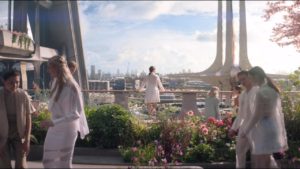 Civilization is in New London, a very modern metropolis in Europe, while Savage’s Reserves are populations confined by electronic barriers in some part of the old United States. These reserves are used as recreation by the civilized, to show the absurd ideas of the peoples of the past, such as family, marriage, pregnancy, prisons, etc.
Civilization is in New London, a very modern metropolis in Europe, while Savage’s Reserves are populations confined by electronic barriers in some part of the old United States. These reserves are used as recreation by the civilized, to show the absurd ideas of the peoples of the past, such as family, marriage, pregnancy, prisons, etc.
Bernard Marx (Harry Lloyd) and Lenina Crowe (Jessica Brown Findlay) go on one of these tours right the moment that a bloody rebellion explodes. They are saved by John (Alden Ehrenreich) and his mother Linda (Demi Moore). Linda herself was a Beta who was abandoned by her companion after suffering an accident on the reservation, twenty years earlier.
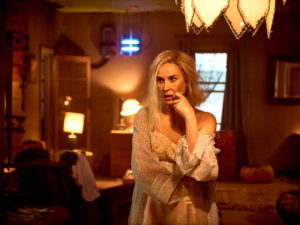 The group returns to New London, but Linda dies from a gunshot wound in her escape. Alone, John is led by Bernard and Lenina through this strange world with values totally different from those he had known. He discovers that everything there is controlled by INGRA, an artificial intelligence that connects everyone through a device applied to the eye, as if it were a contact lens.
The group returns to New London, but Linda dies from a gunshot wound in her escape. Alone, John is led by Bernard and Lenina through this strange world with values totally different from those he had known. He discovers that everything there is controlled by INGRA, an artificial intelligence that connects everyone through a device applied to the eye, as if it were a contact lens.
Over the days, although being relatively successful among the people of New London, John begins to have problems due to falling in love with Lenina, something unthinkable there. Upon being accused of murder, he ends up being transformed into an involuntary leader of an Epsilon revolution, the lowest caste. In fact, everything is going according to a suicide plan by INGRA, and the destination seems to be total annihilation.
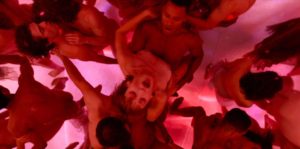 Anyone who has followed me here has realized that the current series is something quite different from Huxley’s original idea. For those who have never read the book, it is a great sci-fi series, with a magnificent look, and by the way the season ended, it is quite possible that there will be a second season.
Anyone who has followed me here has realized that the current series is something quite different from Huxley’s original idea. For those who have never read the book, it is a great sci-fi series, with a magnificent look, and by the way the season ended, it is quite possible that there will be a second season.
If there was no fidelity to the book, it is possible to find numerous references to the 1998 movie, such as a death in an abyss , Bernard’s dazzle with his new office, and the name of artificial intelligence, INGRA. The novelty is this new class (or caste) struggle that never crossed Huxley’s imagination.
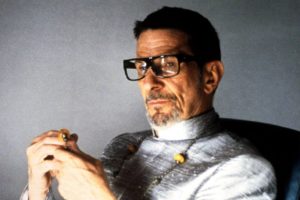 Like any science-fiction work, the book and its various versions are provocative to make us think about what kind of society we would like to live or not. Would we be fine in a society that forbid creative and scientific thinking, even with all the basic needs more than met? Or is that simply a new version of bread and circus?
Like any science-fiction work, the book and its various versions are provocative to make us think about what kind of society we would like to live or not. Would we be fine in a society that forbid creative and scientific thinking, even with all the basic needs more than met? Or is that simply a new version of bread and circus?

